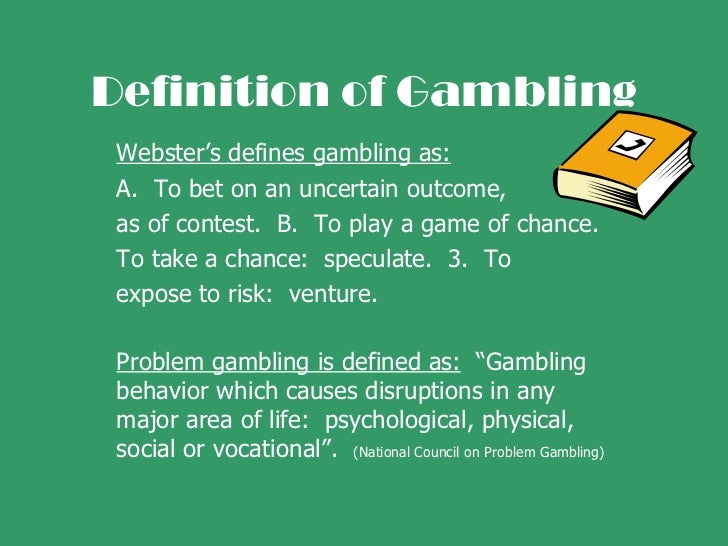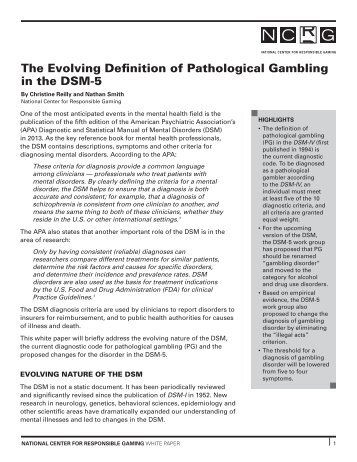Compulsive Gambling Meaning
Therefore, although the language of the ADA specifically refers to 'compulsive gambling,' (32) and many older sources refer to 'pathological gambling,' (33) this Note will use the modern diagnostic language of 'gambling disorder' and 'gambling addiction,' and will refer to individuals with a gambling disorder as 'gambling addicts.' Compulsive gambling is an impulse control disorder that is characterized by an overwhelming urge to gamble. In compulsive gambling, your life becomes.
Last updated: 10/25/2018
Author: Addictions.com Medical Review


Reading Time: 3minutes
For individuals who are suffering from compulsive gambling addiction, life can be difficult on a daily basis. This particular addiction is incredibly damaging to a person’s financial life and many people have had to file bankruptcy simply because they cannot stop gambling. If you feel that a loved one has this addiction, you may want to be aware of the signs that there is a problem. By identifying the signs, you will be able to help the individual overcome this issue.
How to Tell if Your Loved One Has a Compulsive Gambling Addiction

- Compulsive Gambling Also called: Gambling addiction. Many people enjoy gambling, whether it's betting on a horse or playing poker on the Internet.
- That can mean gambling, shopping, overeating and hyper-sexuality. 'I gained about 70 pounds and then lost it subsequently after stopping Abilify,' said the female patient, who added she even.
- Compulsive behavior involves an action that, on its own, is not physically addictive - such as eating, gambling, shopping, internet use, or sex. It is defined as a behavior that is conducted repeatedly due to a strong impulse – often against the best interest of the individual. The lack of a physical addiction separates this condition from alcohol and drug abuse/dependence, but compulsive.
One of the first signs to look for when you think someone has a gambling addiction is what they do on a daily basis. Someone who has this type of addiction may exhibit it in a variety of different ways. One person might be an online casino addict and spend the majority of their time on gambling websites. Another person with a gambling addiction might spend a lot of their day buying and screening lottery tickets from local gas stations and convenience stores. Some people are also addicted to actually going to local casinos in their area and playing the machines that are available there.
Don’t let your loved one suffer from a compulsive gambling addiction any longer.
If you are noticing that a loved one is using one or several of these gambling methods on a constant basis, it could mean that they are suffering from a compulsive gambling addiction. You might also notice that someone with this issue constantly complains about money and financial problems. The person might work a steady job but still not have enough money for bills, rent or even food. Financial distress is a major problem that people who have this addiction have to deal with each day.
How to Confront Someone with this Addiction
If you feel that a loved one has this addiction, you may want to confront them about it. This type of addiction is no different from many others because the addict feels the urges to constantly gamble to see if they are able to win big. Confronting someone might mean something as simple as sitting down and asking them if they feel like they have a problem with their gambling. Some people recognize that they have an issue and are willing to get help for it. Others do not even realize that their gambling is an actual addiction and that it is causing problems in their life financially.
Working with a therapist when dealing with someone who has a compulsive gambling addiction can be thoroughly beneficial to both you and the person involved. Without help, a person with a gambling addiction can spiral out of control, lose all of their assets and face financial ruin. Before this happens, the person needs to understand that they have an addiction and that there is help out there for them if they simply reach out for it. Knowing the person who has the addiction will also help when you actually go to confront them about it personally.
Sources:
Signs of a Gambling Addiction
Compulsive Gambling Addiction
Moderate gambling, like moderate alcohol use, is an accepted part of our culture and causes no problems. As with alcohol use, however, gambling to excess is a common weakness that may lead to serious security problems.
Compulsive gambling, or pathological gambling as most psychiatrists prefer to call it, is an inability to stop gambling even when one recognizes that gambling is causing serious financial, family, work, or other problems.
Compulsive gambling parallels alcohol and drug addiction in many ways. Compulsive gamblers lose control over their behavior and commonly lie and cheat in order to continue their gambling. They frequently try, unsuccessfully, to cut down or quit.
Compulsive gambling does not involve use of a psychoactive substance, but the 'action' which compulsive gamblers crave is an aroused, euphoric state comparable to the 'high' sought by drug users. This aroused state is accompanied by changes in brain chemistry similar to those caused by alcohol or drugs. There may be a 'rush,' often characterized by sweaty palms, rapid heart beat, and nausea which is experienced during the period of anticipation.
Alcoholics and drug abusers develop 'tolerance' for their drug of choice and then must increase their consumption in order to feel the same effects. Similarly, compulsive gamblers develop 'tolerance' for the 'action' and must increase the size of their bets or the odds against them to create the same amount of excitement.
Indicators of Compulsive Gambling
Compulsive gamblers tend to be bright, energetic, competitive, adventuresome individuals. In short, they may have the characteristics of an otherwise ideal employee. There are no obvious physical signs. Unlike some drug or alcohol abusers, there are no needle marks, breath odor, slurred speech or staggering gait. Like alcoholics and drug addicts, compulsive gamblers typically deny any problem until they hit rock bottom and are desperate for help.
One of the clearest indicators of a serious gambling problem is borrowing money to gamble or to pay off gambling debts. This is the heart of the security issue, which is the gambler's need for money. Another significant indicator is any effort to conceal one's gambling from spouse, children, friends, or co-workers, e.g., hiding betting slips or lottery tickets. This indicates some shame or embarrassment about one's behavior.
Other indicators of a potential or actual gambling problem include: gambling as a way of escaping from problems or relieving feelings of helplessness, guilt, anxiety, or depression; needing to gamble with increasing amounts of money in order to achieve the desired excitement; and repeated unsuccessful efforts to control, cut back, or stop gambling
Compulsive gambling has been called the 'hidden disease,' as there are few overt signs of it in the workplace until the problem is in its most advanced stage. Astute observers may, however, pick up clues.
- Late to work (due to late night card game, casino venture, or bad night's sleep worrying about gambling-related problems).
- Long lunches (betting, gambling or setting up loans).
- Mysterious disappearance in the afternoon (typically at the track, off-track betting, afternoon card or dice game, or listening to sporting events).
- Sick days taken right when they become available rather than allowed to accumulate (uses sick days to gamble).
- Vacation used in isolated days rather than blocks.
- Excessive use of the telephone (calls to off-track betting, bookie, creditors, or to find money; calls from bookie or creditors).
- Operates office sports pool or paycheck pool (the person running these sometimes has a gambling problem).
- Collects money from other employees.
Compulsive Gambling Meaning Dictionary
Compulsive Gambling Meaning Definition
References 1. Gambling Impact and Behavior Study: Final Report of the National Gambling Impact Study Commission. University of Chicago: National Opinion Research Center, March 18, 1999.
2. G. J. Smith, R. A. Volberg & H. J. Wynne (1994). Leisure behavior on the edge: Differences between controlled and uncontrolled gambling practices. Society and Leisure, 17, 1.
3. This section is mainly a mixture of quotation and paraphrase from the work of H. Lesieur. The compulsive gambler's spiral of options and involvement. Psychiatry: Journal for the Study of Interpersonal Processes (1979), 79-87 and The female pathological gambler, in W. R. Eadington (Ed.), Gambling studies: Proceedings of the Seventh International Conference on Gambling and Risk Taking, (Reno, NV: Bureau of Business and Economic Research, University of Nevada).
4. L. Lieberman (1988). A social typology of gambling behavior. (New York State Office of Mental Health contract #C-001361). New York: National Council on Compulsive Gambling, pp. 44-49.
5. H. Lesieur & M. Heineman (1988). Pathological gambling among youthful multiple substance abusers in a therapeutic community. British Journal of Addictions, 83, 765-771.
6. H. Lesieur (1988). The female pathological gambler. In W. R. Eadington (Ed.), Gambling research: Proceedings of the Seventh International Conference on Gambling and Risk Taking. Reno, NV: Bureau of Business and Economic Research, University of Nevada-Reno.
7. H. Lesieur (1986). Understanding compulsive gambling, (Center City, MN: Hazelden Educational Materials).
8. R. J. Heuer, Jr. (1992) Compulsive Gambling: Background Information for Security Personnel (Monterey, CA: Defense Personnel Security Research Center.) Reprinted in the journal Polygraph, Vol. 22, No. 1, 1993.
9. Jane E. Brody, 'Compulsive Gambling: Overlooked Addiction,' New York Times, May 4, 1999, p. D7.
10. H. Lesieur & R. Rosenthal (1991). Pathological gambling: A review of the literature. Journal of Gambling Studies, 7, 5-40. Hospital sample is from H. Lesieur, S. Blume & R. Zoppa (1986). Alcoholism, drug abuse, and gambling. Alcoholism: Clinical and Experimental Research, 10, 33-38. Veterans Administration and Gamblers Anonymous sample is from R. Nora (1984, December). Profile survey on pathological gamblers. Paper presented at the Sixth Annual Conference on Gambling and Risk Taking, Atlantic City, NJ. Sample of female Gamblers Anonymous members is from H. Lesieur (1987). The female pathological gambler. In W. R. Eadington (Ed.), Gambling research: Proceedings of the Seventh International Conference on Gambling and Risk Taking, (Reno, NV: Bureau of Business and Economic Research, University of Nevada-Reno).
11. H. Lesieur & K. Puig (1987). Insurance problems and pathological gambling. Journal of Gambling Behavior, 3, 123-136.
12. J. Ciarrocchi (1987). Severity of impairment in dually addicted gamblers. Journal of Gambling Behavior, 3, 16-26
13. H. Lesieur (1988). The female pathological gambler. In W. R. Eadington (Ed.), Gambling studies: Proceedings of the Seventh International Conference on Gambling and Risk Taking, (Reno, NV: Bureau of Business and Economic Research, University of Nevada).